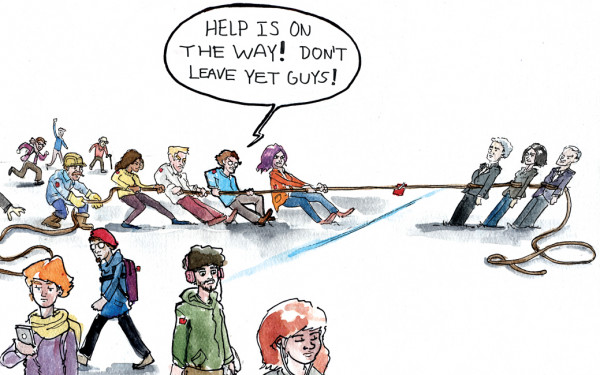Students Join Forces Against Pipelines
New Student Coalition Created to Protest Fossil Fuel Pipelines
TransCanada has a new, younger generation of formal opposition. The Concordia Student Union, alongside three other student unions, have formed the Coalition ÉCO, or Étudiants et étudiantes contre les oléoducs, to demand an end to fossil fuel pipelines.
“It started with discussions between different student associations—part of these discussions [were] about creating a student voice around climate change,” CSU VP External and Mobilization Anthony Garoufalis-Auger told The Link of the coalition’s origins.
The Fédération étudiante de l’Université de Sherbrooke, the Dawson Student Union and the International Federation of Medical Student’s Associations-Québec have joined the CSU as founding members of the coalition.
Climate change is an expansive, global subject, so the original discussions between the four member groups became a search for a specific ecological issue in Canada to target, he continued.
“One of the most imminent [issues] is the pipeline—specifically Line 9B and the TransCanada Energy [East] pipeline,” he said.
The Energy East pipeline would connect Hardisty, Alberta to Saint John, New Brunswick across 4600 kilometers over six provinces. Extracting and transporting oil from tar sands in Alberta to the east coast refineries is TransCanada’s goal. The current timeline for the project expects final approval next year and to be commissioned and in service to Quebec by 2018, according to its website.
In an interview with The Guardian, James Hansen, former head of the NASA Goddard Institute for Space Studies, explained that separating oil from the tar sand rock produces three to four times more carbon emissions per barrel than conventional oil. The full exploitation of tar sands would be “game over” for the climate, Hansen said.
Garoufalis-Auger argues that TransCanada doesn’t want to acknowledge this theory because their entire business model is centered on fossil fuel extraction.
“It’s convenient for them to ignore the issue of climate change,” Garoufalis-Auger said. “They’ve done a pretty good job in their public relation campaigns to not address the issue whatsoever.”
Part of the coalition’s mandate is to bring this issue to the forefront of discussions involving the pipeline. TransCanada can’t argue with the scientific evidence for climate change, Garoufalis-Auger added.
“On the issue of climate change, they don’t win. They can’t win. It’s just pretty stark in the scientific consensus.”
Dr. Satoshi Ikeda, a professor of political sociology, political economy and organizations at Concordia University, told The Link that destruction of the livelihood of First Nations people and inevitable ecological disturbance were excluded from TransCanada’s cost calculation to keep Canadian oil exports cheap. No pipeline is fail-safe, and when it fails, the corporations cannot restore it to its original state, he added.
Canada is currently on track to miss its greenhouse emission targets and is one of the “world’s leaders in not respecting the emission levels,” said Garoufalis-Auger. He added that the original target was “already a joke.”
“There is a point in climate change when the temperature rises too high, we’re going to reach tipping points which are irreversible,” Garoufalis-Auger continued. “It’s not something far in the future.”“We’re talking about somewhere in this century.”
In response to an inquiry about ÉCO, a spokesperson from TransCanada told The Link that that people tend to gain a better opinion of the pipeline as they learn more about how “important oil is in their lives.”
TransCanada “accepts” the transition into “green technology” by investing “over five billion dollars” into its research, but oil is still necessary and pipelines remain the safest method of transport, the spokesperson continued.
The Municipalité régionale de comté Vaudreuil-Soulanges recently announced that they’re against the Energy East Pipeline, citing a lack of substantial evidence that the company has a foolproof emergency plan in case of a spill.
Garoufalis-Auger said it’s important Quebec municipalities like the one in Vaudreuil-Soulanges oppose projects that have negative environmental effects, especially ones overseen by companies who aren’t consulting communities their projects affect.
“[The municipalities] see it not only as an insult to the environment but to their democratic right to control what comes through the communities,” Garoufalis-Auger added.
Combined, the four student associations represent over 66,000 students. Other schools in Montreal and Quebec are showing interest in joining the foursome, according to Garoufalis-Auger. Undergraduate students at McGill University are having a referendum to join ÉCO this week.
“Students have a lot to lose not trying to fight these pipelines,” Garoufalis-Auger said. “We’re in a generation that’s currently going to be most impacted by climate change.”
Some demands ÉCO have made include beginning the transition to a fossil fuel-free society by 2050 now and transforming the university system into the engine of this transition.
In order to implement this change, universities like Concordia need to have more courses focused on sustainability, which ultimately will produce the type of professionals that are capable of creating solutions to mitigate climate change and fossil fuel usage, Garoufalis-Auger added.
The group’s first organized effort will be a protest against fossil fuel projects and the provincial government’s Plan Nord, an economic development project focused on mining in northern Quebec, on Nov. 15.
Garoufalis-Auger said that “over 1000 people” are expected to participate in the event. Plans for ÉCO’s future action against the Energy East Pipeline will be announced that day. The protest begins at the corner of Guy St. and de Maisonneuve Blvd. at 1 p.m.



2_600_375_90_s_c1.jpg)
2_600_375_90_s_c1.jpg)
05_600_375_90_s_c1.jpg)
